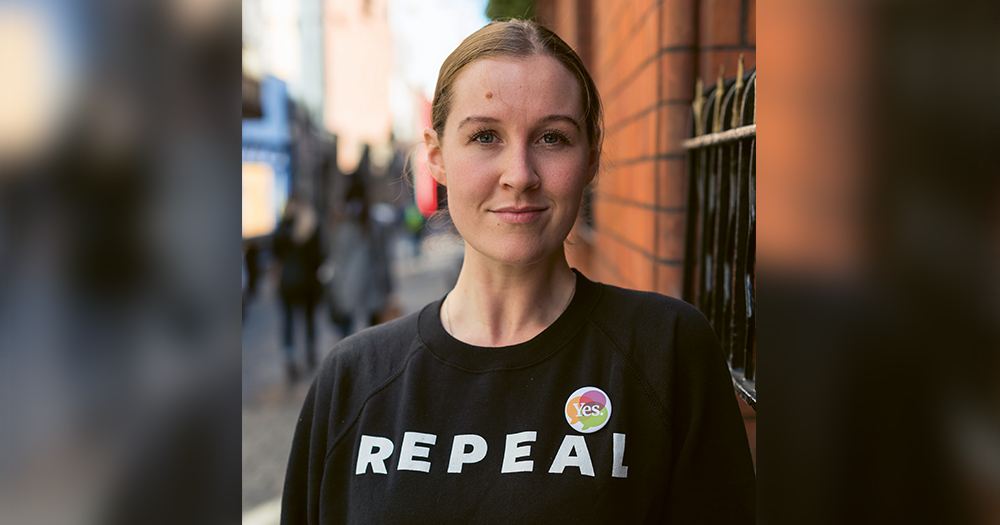Affected by the death of Savita Halappanavar, Anna Cosgrave set up Repeal Project – the organisation behind the iconic black jumpers which have become synonymous with the movement to repeal the Eighth Amendment.
I was a super-hyperactive, problematic child. I grew up on a farm just outside Rathnew in Wicklow and went to a really strict, all girls boarding school where I was constantly told to act ladylike, so coming up to Dublin was like a liberating moment of freedom. I went to college in Trinity and ended up eventually dropping out, but I had such an unbelievable time there in terms of my whole mind being opened.
I was in college when I went to the Savita vigil, and I just can’t describe it. I was so unbelievably haunted. I went back to my room and started researching the Eighth Amendment.
I’ve always been interested in how we can engage civic society to care about social issues. Every single movement has had pins or badges, or sashes, or colours. I felt at the time in Ireland the grassroots groups weren’t yet infiltrating the mainstream, so this was my way of shouting while being silent. When I was in secondary school I ran Students Unite For Children’s Health. We’d put on fashion shows and create merchandise, so this was an extension of the things I did when I was younger.
Two years ago, people were nervous about wearing the jumpers. I’d ask friends if they would wear one and there was a little bit of hesitation. I had to borrow €300 from my housemate to buy the first boxes. I asked people for advice, and they’d say, “I don’t think that will work, because ‘Repeal’ doesn’t really mean anything to anyone right now.”
It makes me so excited when I see young girls who can’t even vote yet wearing them. If I have given an inlet into activism or politics for young women, that is great, but I also recognise that not everybody warms to it or it’s not their form of activism, and that’s okay too.
I feel so enraged and overwhelmed that women still aren’t even in the preamble to the Constitution, and how the debate around the eighth is framed in the national narrative. How the women we are currently fighting for, their mothers and grandmothers lived the legacies of the Magdalene Laundries and the Mother and Baby Homes – that this history is our present and those women are still living.
It feels so sad when you see the slogan from the No side – ‘Love Them both’, because who are they loving? They don’t love women in refuges with their families, they don’t love women who had fatal foetal abnormalities; they don’t love lesbian women who’ve been so vilified in the media.
The misinformation from the No side is so damaging and actually has real-life consequences. Even if you look at the //Late Late Show// debate – they had a master of a maternity hospital, a medical expert, against, on the other side, a journalist for a religious radio station. If I was pregnant, who would I turn to? It’s actually the same as saying, “Oh, I need a filling, I’m gonna go ask the baker.”
But I do forgive some people who are unsure or who might have been brought up pro-life. I understand that there are massive forces at play here, that the narrative of morality is being controlled by an extremely wealthy group of people.
I feel very grateful to have had so many women share their stories with me. I will still be learning the magnitude of the hurt this Eighth Amendment has caused for the rest of my life. I had a bit of naivety starting this, in that I didn’t realise the extent of the trauma because I hadn’t met as many women as I have now.
I think the reason why LBGT people support repeal is because with groups that are marginalised there’s solidarity because we have shared experience of oppression. In an Irish context, the forces that oppose abortion access are the same forces that opposed marriage equality.
I’ve been asked how this process has changed my relationships with people, but the biggest relationship change has been with Ireland. I now feel I’m getting closer to being able to say that I’m proud to be Irish. From the conversations I’ve had with people, from the work such a cross section of generations have put into this, and for that realisation that for all the things I don’t like about Ireland, the people that I love aren’t guilty for making it that place.
To find out more about The Repeal Project, visit repeal.ie
This article originally appeared in Issue 342 of GCN, read here.
© 2018 GCN (Gay Community News). All rights reserved.
